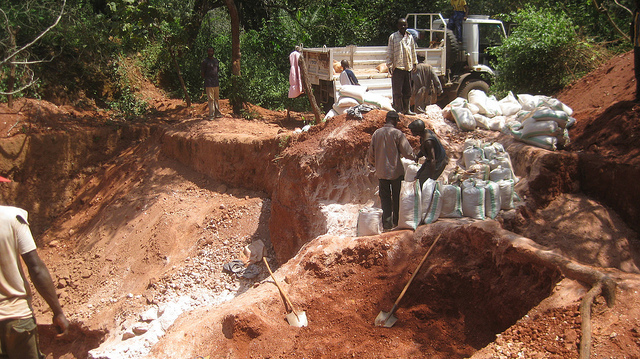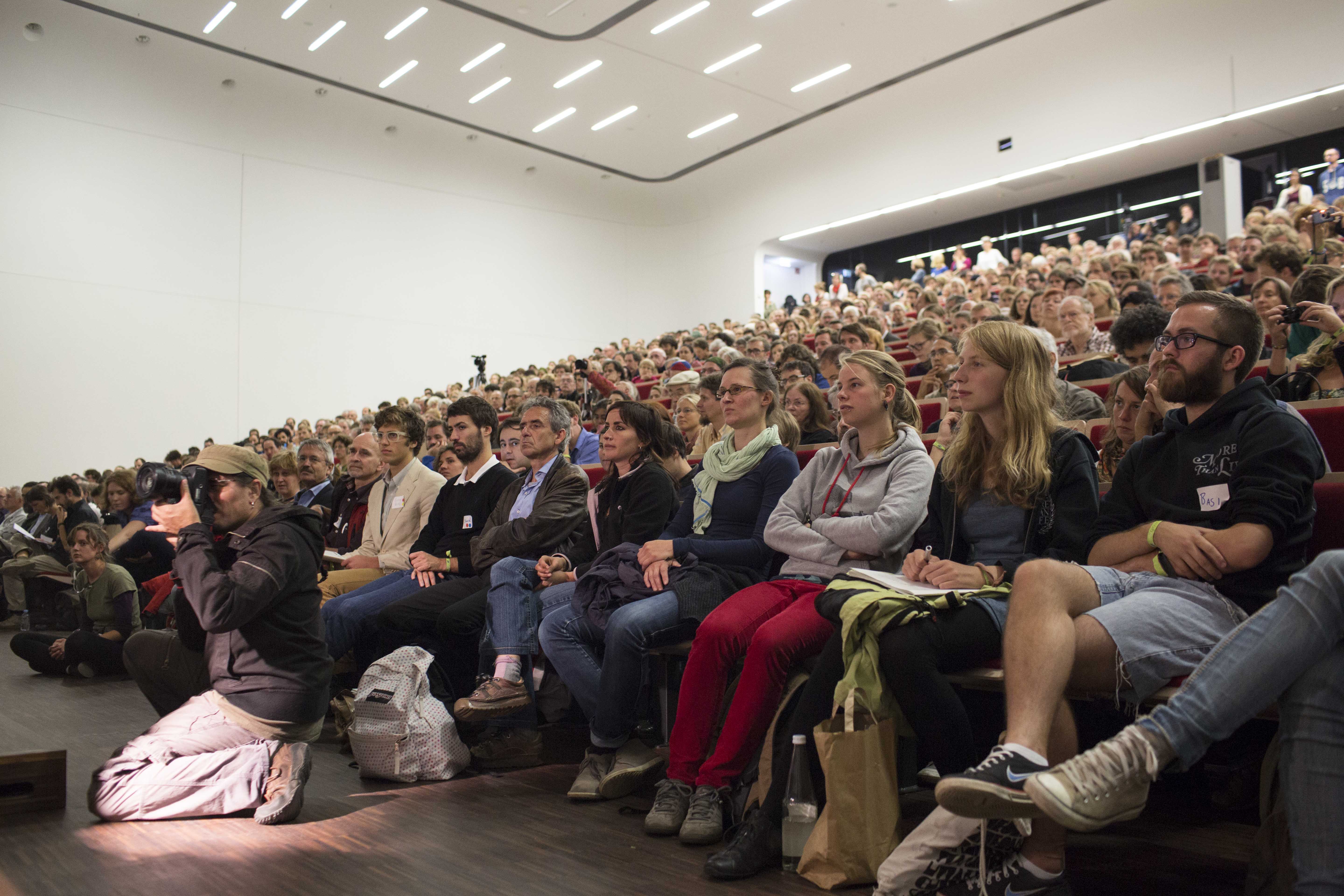Without trying to give definitions of growth or degrowth everybody knows anyway, I would like to emphasize that these phenomena were always subject to discussions. Even a non-economist knows that it is impossible to talk about growth without mentioning ideas like increases in production factors, industrialization or economic development.
Any increase has to come to a limit which forces us to go back to realistic and sustainable foundations, whether we like it or not. This is the meaning of degrowth as we know it. The question now is how we would like to see the economy of Africa to develop, and how this could be compatible with the concept of degrowth for Northern countries, whose economic growth seems to have reached its limit.
My contribution is not based on wishful thinking, but on my personal engagement, together with my husband, for a development different from the one based on economic growth. This means that we have recognized the limits of development as promoted by the European civilisation, especially when compared to the dream of an agrarian civilisation that emerges from our past societies: a dream we worked to see become reality.
When reaching independence, all African countries aspired to the kind of development achieved by European countries, according to the development criteria defined by the United Nations. Africans would go to school to leave archaic ways of life behind and one day experience modernity in the cities. Despite the protest of those who thought that "Africa was on a wrong path", everyone wanted to get rid of the past African way of life, to enter the civilisation of economic growth. I remember how, in the beginning, we were criticized for building our centre in round huts and covering them with straw, for building the maternity ward in the style of a peasant family house where mothers, babies and visitors could have a family life.
We were even blamed by official agricultural services for using vegetal waste to produce organic fertilisers when we were recommending this environmentally friendly practice to local peasants. This search for a development model based on European concepts led a majority of African countries into under-development. As for us, our vision was clear and built upon on the past peasant society that was our dream. We were not trying to get back to the stone age, but to an ecological life; sustainable and built on solidarity.
With our work, we bring this civilisation close to young people who get trained at our centre and learn about life in the agrarian Nawda society. Everyone, men and women, work in a spirit of mutual aid. They all work at someone else´s place as if they were building their own living space. One considers other people´s places as his or her owns. Huts, partitions and roofs for the weak, the old or the widows are built, repaired and maintained just as oneself´s. It is their community, and their common property.
The same happens during work in the dry season: the fields of the weak, the old or the handicapped are ploughed without asking for any reward. What matters is the notion of common property, the notion of heritage from our ancestors, of everyone committing to maintain and perpetuate in a spirit of solidarity. The harvesting is done in the same rhythm: they harvest as they have ploughed, sowed and maintained, and the production goes into the granary of the family to whom the field belongs, as a property common to all.
We did not cultivate or produce a materially prosperous, but a good life: we cultivated to perpetuate the way of life of the ancestors of the village, we cultivated to educate the young ones to the notion of "Kpaturu", of family, of village, solidarity, union and sharing. In that same spirit, the crop is used to feed the poor, the orphan, the widow, the weak, and to welcome the stranger.
In the time of our ancestors, this life of sharing each other´s goods which are at the same time one´s own, had built a solidary and peaceful society. It was not a utopia, it was real: the solidary agrarian society of the Nawda country. Through this faith in agriculture, this rhythm and this solidarity, it succeeded in repelling hunger, poverty, shortage and misery beyond its borders. Unfortunately, this society disappeared under the impact of multiple crises.
As Africans, my husband and I have committed to become the development that we wished to see for Africa. For this we needed to make choices against the mainstream perception that any kind of university degree meant for its owner the liberation from the harsh tasks of ordinary people and a passport for the city. So, despite our degrees, we had chosen not to fill the positions waiting for us in the city, but to return to the village to live among its people, for the courage of the ancients to be renewed in us. Therefore, we had to build the framework in which our life would take place.
Conscious that the development based on economic growth was breaking down around us, we strived to progressively build a world carried by the population itself instead of an economic system that isolates the poor, the young, the women and peasants. In the village, we worked for 30 years to lay the foundations of a development centred on humanism. We were convinced that building our future means building the base of a real development. We believe that our work today creates a trail for the small businesses of tomorrow's people of good will. This is how the International Center for Agro-Pastoral Development (CIDAP) came into life, with the aim to:
To better understand the vision of CIDAP 1, we can quote the definition provided by its first members in 1989, after 5 years of working and living together:
"Our association is looking for self-promotion, self-organization, working for the fulfilment of human beings. We always said that we wanted to show that, through patient work, we can turn poverty into wealth. And we declare that we use the donations of our friends to create tools at the service of our needs, and that our salary is the satisfaction of working on the formation of centre that will bear fruits tomorrow."
We work in a context of almost absolute poverty. Our task is to sow hope in this environment, to defeat fatality and to give the will to live back to those who come to us. As per this definition, our mission has its strengths and its limits. As main strength, we see the ability to start from very little and to grow. The ones who deserve our attention are those who have materially nothing, who are at the bottom of the ladder and whom we help rise. In our work, we start to create wealth from straw, herbs and waste. We always answer to those who are outraged to see the founders of CIDAP living in the dust of the village despite their degrees, that our ambition was never to be at the top. Our world is at the basis and we intend to stay there.
As another strength, we see the spirituality that guides us: we strongly believe that each of us has a mission to accomplish in this world. We are sure that our place is next to our ancestors, to benefit from their wisdom and bring our energy. But this is only possible by following the road they traced: that of sharing, solidarity and African dignity, which is regrettably on the verge of extinction in our society.
As limits, we feel that it is difficult for us to leave behind our ways of living, working and loving. Our friends or neighbours have difficulties to understand and follow us. We are conscious of this and work on correcting this weakness.
CIDAP´s development approach integrates the philosophy of its members and of the people for whom it was founded. The solutions to socio-economic problems emerge from a creative work that valorize the human being and give back its dignity, on the basis of local socio-cultural values.
CIDAP´s perception of external development aid is that of a means of action just as what is brought by every member and every community involved. It does not enrich a family or a particular group, but it is used for realizing the ideals that guide the centre. And ideals are never the property of one individual.
As for the agrarian ideal of CIDAP, the goal is to offer the chance to rural communities to stand for themselves. External aid must therefore be integrated into the whole. We also know that such aid implies the idea of a strong partnership based on the spirit of cooperation, solidarity and sharing.
In the course of our engagement, we have heard that any action which does not contribute to growth should disappear. We have always been asked for figures, to see if our action was economically viable, but they always forgot to ask if we were happy, if our ecological lifestyle was healthy, if we had solidary connections to other people. In this sence, of course, our action achieved results:
All these struggles made us agents of multiplication, of creation of value where there was only sterility, loss and damage.
Translation from French: Nicolas Guenot

How migration relates to the imperial mode of living, degrowth and new internationalism We are currently facing the most severe migration crisis in history. But this is only one dimension of a broader civilizational crisis. Thus, anti-racist movements should not focus solely on issues of human mobility rights, but also build new paths of solidarity with societies in the geopolitical Global Sou...
The workshop “How to sell degrowth: Business models II” was a short paper session following the scientific paper session “How to sell degrowth: Business models I”. Gabriel Trettel Silva as the first presenter rose the question of whether or not profit-making is compatible with the principles of a steady-state economy. His own conclusion was that it [...]

By Christiane Kliemann "Facing the current crises: critique and resistance": The motto of the second day´s conference programme takes into account that degrowth is mainly a concept from the global North which naturally has a different perspective on the mulitfaceted global crisis than social or ecological movements from other parts of the World. While degrowth can be described as "a downscali...